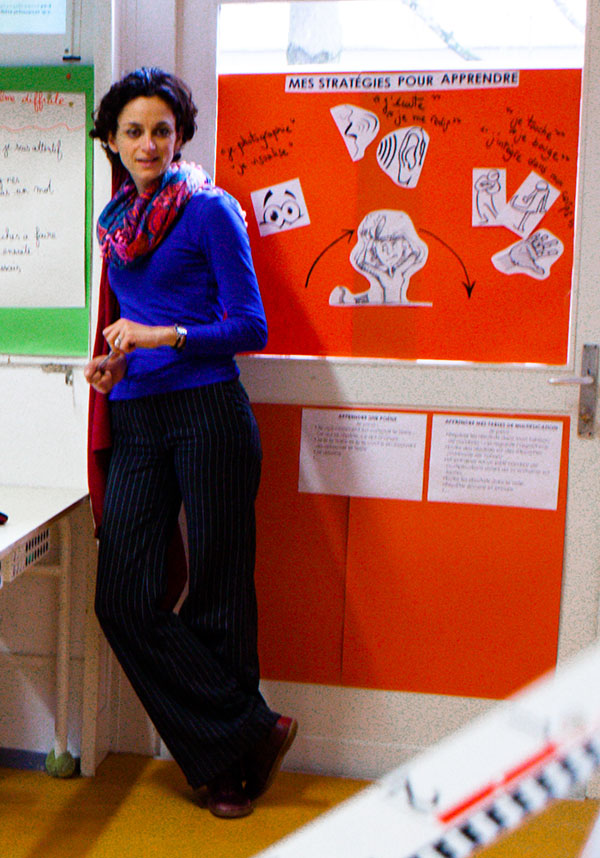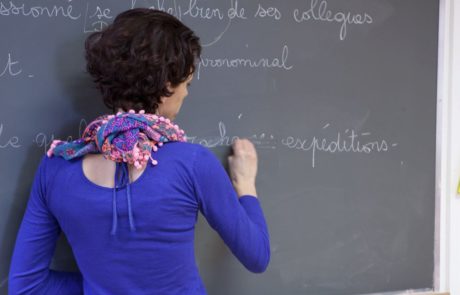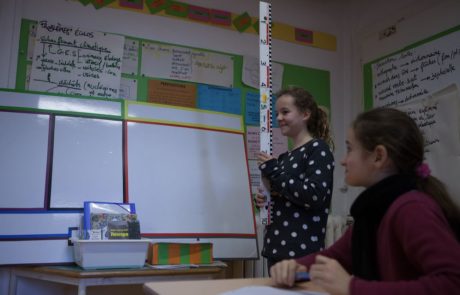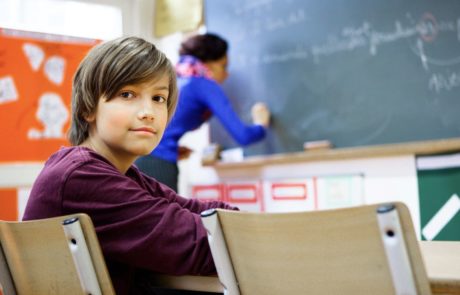CLASS
05
At this level, the children reach the end of primary school and prepare for secondary school
Cycle IV – Class (7P-8P) – Marie, Natascha and Nathalie
Children build learning skills through research situations, alternating between individual and collective work: the main stages of learning are: making hypotheses, verify, confirm (or not), clarify procedures, as well as individual and collective structuring of concepts.
Reading and writing are a happy and almost daily occurrence, at the centre of all disciplines, whether through:
- children’s literature, reading workshops (with classes 3 and 4, in conjunction with the school library), the weekly library session, cross-curricular projects, personal readings or books read to the class by Marie.
- Personalized training in scholarly reading with the ELSA software of the Association française pour la lecture (AFL)
- The creation of texts during writing workshops (copying encouraged!)
- Writing as a tool for thinking and learning in successive phases of various environmental projects.
The study of the French language involves various activities including the use of the grammar method by Maurice Laurent and regular writing.
Modern Languages: English co-teaching one day a week. German lessons once a week according to the PER (Plan d’Etudes Romand)
Mathematics: pupils are regularly confronted with problem solving situations. The use of manipulatives is encouraged.
The program includes research problems which can be solved and procedures that can be explained by working together.
To the delight of children who like to take up challenges, we participate every year in the great transalpine maths rally.
Computers and iPads are provided. The children in 8P have the privilege of having an individual iPad on which they can work in class and at home. Computers are used as a working tool and not seen as an end in itself. We generally use it:
- as a writing tool: class blog, layout of pupils’ texts
- as a training tool: use of various intelligent and fun applications (Projet Voltaire, etc.)
- to create individual or collective tutorials on the concepts covered in French, English or maths
- to gather information: various internet searches on the topics covered
Natural sciences, humanities and social sciences are studied through research (individual writing of an essay on a chosen topic) and projects according to the theme of the year and the centres of interest (creation of a vegetable garden, setting up a school energy challenge, organising a day to raise awareness on sustainable development, etc.). At the end of the year the research will be presented to the whole class or the school.
Field trips are often organized as part of these studies: For example: we took the opportunity of a project on the “Fête de l’Escalade” to visit the old town of Geneva as well as have a guided tour of the Museum of the Reformation.
Arts & Crafts classes are proposed on a weekly basis by a specialized teacher.
Other cultural events or outings are organized during the year (theatre, cinema, museum….) and once a year the whole school will participate in a “Musical Week”, discovering music, dances, traditions from other parts of the world.
Philosophy: once a week, the children meet for an hour in a community of inquiry. They learn to put forward hypotheses, to listen to each other, to build their ideas from those of others, to propose examples, counter-examples, to make analogies… Subjects can be started by questions raised in the daily life of the class, from a song, a short film, a newspaper article, a painting…
Sports: we favour group games (kin-ball is especially appreciated by the older children…) not forgetting the “classic” long distance running, swimming…
We remain open to proposals: outings to the ski slopes or the ice-skating rink are very popular and students are eager to help organizing them.
Preparing for secondary school means further consolidating autonomy by acquiring skills such as:
- Defining one’s learning strategies (what do I need to learn? how can I do it?)
- Organising a complex task (How can I sequence it ?)
- Managing homework
- Making use of the help that is available (lessons, books, posters, peers, etc.)
- Managing emotions when faced with work that requires perseverance and effort.
In our class, as well as in the whole school, everyone learns to take their place, to respect themselves and others.
We get together twice a day for a class meeting: a moment of convivial sharing, during which each one gives, as he/she wishes, his/her personal news in the morning and then gives a review of the day before the end of class.
The class council takes place once a week in order to discuss the concerns of the group, launch or review projects and congratulate each other for a job well done.
In addition, we do various activities to learn how to manage conflicts as “positively” as possible: games that help us to get to know each other, to express our emotions, to understand what may be at stake, to help us to become mediators one day…
Finally, let’s not forget that the older children of the school, 7P-8P, also grow up by collaborating with the younger ones, thanks to the sponsorship but also during the various mixed-aged workshops at school: Christmas workshops, English Day, board games afternoons, work on “repairing the playground”…


More pictures
Just click on a picture to enlarge it







